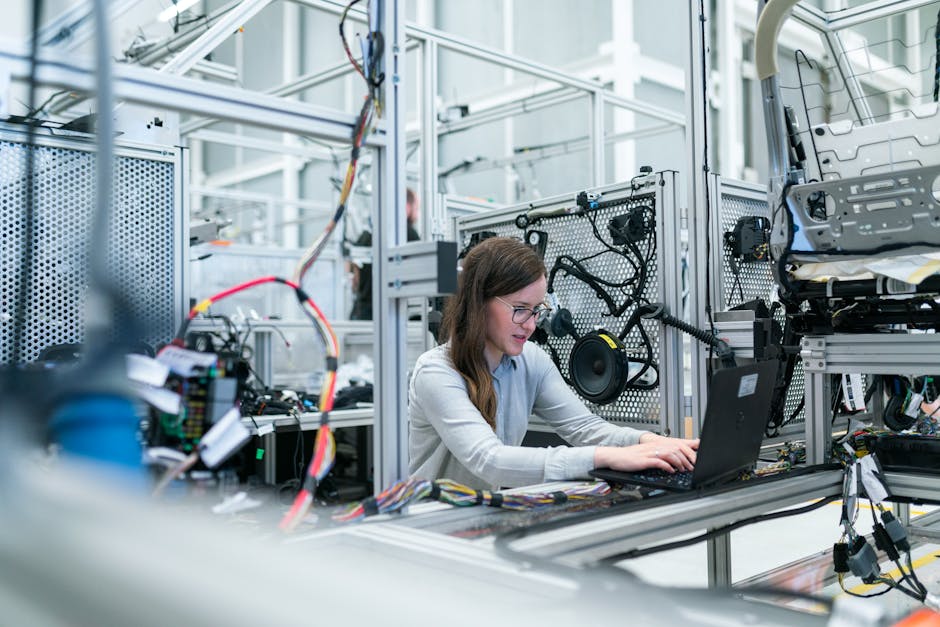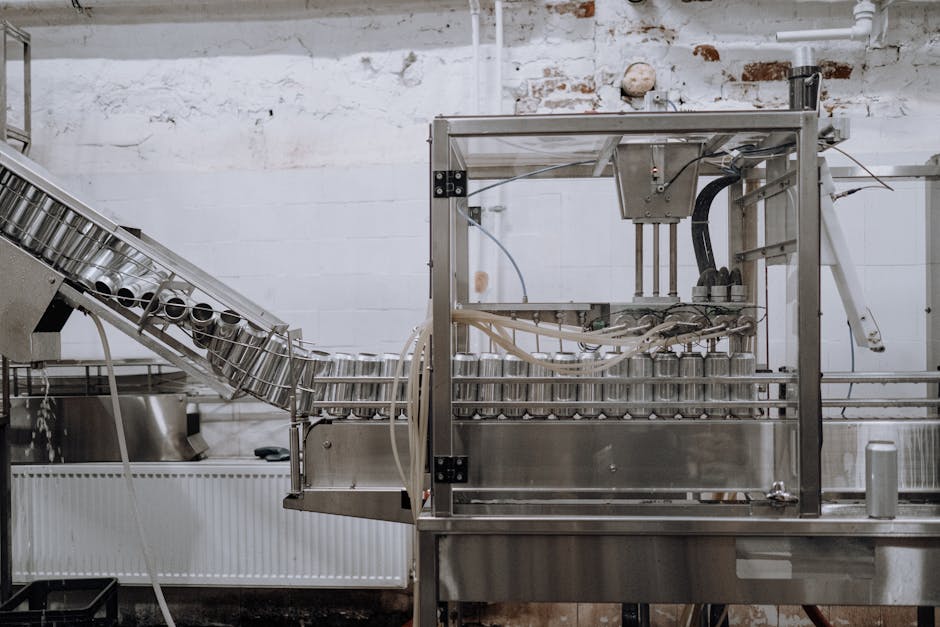Leicester’s Manufacturing Sector: Embracing Change and Innovation
Leicester’s manufacturing sector has demonstrated an impressive capacity for adaptation and advancement in recent years.
Amidst the evolving global landscape, the city’s manufacturing industry has embraced change and innovation, positioning itself at the forefront of technological advancements.
This strategic shift has not only revolutionised manufacturing processes but has also fostered a culture of innovation and sustainability within the sector.
Leicester’s manufacturers have adeptly navigated shifting economic realities, leveraging opportunities for global competitiveness.
This transformation underscores the sector’s resilience and commitment to remaining a key player in the global manufacturing arena.
Key Takeaways
- Leicester’s manufacturing sector is embracing change and innovation through the integration of advanced technologies like IoT, AI, and robotics.
- The sector is focussed on sustainability and driving innovation through the implementation of energy-efficient technologies, renewable energy sources, and sustainable supply chain management practises.
- To adapt to shifting economic realities, Leicester’s manufacturers are diversifying their product range, developing agile supply chains, investing in research and development, and collaborating with other industries.
- The sector is investing in innovation and collaborative partnerships to enhance productivity, efficiency, and global competitiveness, while also diversifying its product range and reducing dependency on specific regions.
Evolution of Leicester’s Manufacturing Landscape

The evolution of Leicester’s manufacturing landscape has been marked by a shift towards high-tech production and automation. This transformation, often referred to as Industry 4.0, represents a significant departure from traditional manufacturing methods. Leicester’s embrace of digital transformation has led to the integration of advanced technologies such as Internet of Things (IoT), artificial intelligence, and robotics into the manufacturing processes. This shift has not only enhanced productivity but has also improved the overall quality of products, making them more competitive in the global market.
Industry 4.0 has revolutionised Leicester’s manufacturing sector by enabling interconnectedness between various stages of production, facilitating data-driven decision-making, and optimising resource utilisation. The adoption of smart manufacturing technologies has allowed Leicester to streamline operations, reduce downtime, and minimise errors, leading to increased efficiency and cost savings. Furthermore, the implementation of digital transformation has paved the way for the creation of highly skilled jobs in the region, driving economic growth and prosperity.
Technological Advancements Reshaping the Industry

Leicester’s manufacturing sector’s embrace of Industry 4.0 has seen a significant impact from technological advancements reshaping the industry. The automation revolution and digital transformation have led to the rise of smart factories, fundamentally changing the way manufacturing processes are carried out. Smart factories utilise advanced technologies such as the Internet of Things (IoT), artificial intelligence, robotics, and data analytics to optimise production, improve efficiency, and reduce waste. This shift towards automation and digitalisation has not only increased productivity but has also brought about a more flexible and responsive manufacturing environment.
| Technological Advancements | Impact |
|---|---|
| Automation Revolution | Streamlined processes and increased efficiency |
| Industry 4.0 | Integration of digital technologies into manufacturing |
| Digital Transformation | Enhanced data analytics and predictive maintenance |
| Smart Factories | Improved productivity and flexibility |
The integration of these technologies has paved the way for a more sustainable and competitive manufacturing sector in Leicester, positioning the region as a hub for innovation and technological advancement. As Leicester’s manufacturing industry continues to evolve, the adoption of these technological advancements will be pivotal in driving future growth and success.
Embracing Change in Manufacturing Processes

Embracing change in manufacturing processes, Leicester’s industrial sector has witnessed a notable shift towards greater agility and adaptability, driven by advancements in automation and digitalisation. This transformation has prompted manufacturers to re-evaluate their traditional methods and embrace innovative approaches to improve efficiency and optimise processes.
Key initiatives driving this change include:
- Integration of advanced robotics and AI technologies to streamline production lines.
- Implementation of data-driven analytics for real-time monitoring and predictive maintenance.
- Adoption of lean manufacturing principles to minimise waste and enhance productivity.
- Collaboration with technology providers to customise solutions for specific manufacturing needs.
Innovation and Sustainability in Leicester’s Manufacturing

Leicester’s manufacturing sector is at the forefront of embracing sustainable practises and technological innovations.
Sustainable manufacturing practises not only benefit the environment but also contribute to long-term cost savings and efficiency.
Furthermore, technological innovation impacts the industry by enhancing productivity, quality, and adaptability to changing market demands.
Sustainable Manufacturing Practises
The manufacturing sector in Leicester has been actively integrating sustainable practises to drive innovation and enhance its commitment to environmental and social responsibility. This proactive approach toward sustainable manufacturing is transforming the industry in Leicester and setting an example for others to follow.
Some key sustainable manufacturing practises being adopted in Leicester include:
- Implementation of energy-efficient technologies
- Adoption of renewable energy sources
- Reduction of waste through recycling and reuse initiatives
- Integration of sustainable supply chain management practises
These initiatives not only contribute to the reduction of the environmental impact but also lead to cost savings and improved brand reputation. The focus on sustainable practises is positioning Leicester’s manufacturing sector as a leader in green manufacturing. These efforts are not only beneficial for the environment but also for the long-term viability and competitiveness of the industry.
Moving forward, it is essential to explore how technological innovation impacts these sustainable manufacturing practises.
Technological Innovation Impacts
In Leicester’s manufacturing sector, technological innovation is significantly impacting sustainable practises and driving advancements in production efficiency.
The integration of Industry 4.0 technologies has led to notable productivity improvements, enabling manufacturers to streamline processes, reduce waste, and optimise resource utilisation.
Automation benefits have been pivotal in enhancing operational efficiency and precision, contributing to a more sustainable manufacturing ecosystem.
However, this rapid technological advancement also presents workforce challenges, necessitating the upskilling of employees to adapt to the evolving manufacturing landscape.
As Leicester’s manufacturing sector continues to embrace technological innovation, it is crucial for businesses to balance the implementation of advanced technologies with the development of their workforce, ensuring a sustainable and competitive industry for the future.
Adapting to Shifting Economic Realities

Leicester’s manufacturing sector’s ability to adapt to shifting economic realities is crucial for its long-term sustainability and growth. Economic resilience and industry transformation are essential for the sector to thrive amidst changing economic conditions. Market demand plays a pivotal role in dictating the direction of manufacturing activities, making it imperative for businesses to develop effective adaptation strategies.
-
Diversification: Leicester’s manufacturing sector should consider diversifying its product range to cater to evolving market demands. By expanding into new product lines or niche markets, businesses can reduce their vulnerability to economic fluctuations and enhance their competitive advantage.
-
Agile Supply Chains: Developing agile supply chains that can quickly respond to changes in market demand and economic conditions is critical. This flexibility enables manufacturers to adjust production levels and product offerings in a timely manner, ensuring they remain responsive to shifting economic realities.
-
Investment in Innovation: Embracing technological advancements and investing in innovation allows manufacturers to stay ahead of the curve. This proactive approach not only enhances productivity and efficiency but also equips businesses to adapt to economic transformations more effectively.
-
Collaborative Partnerships: Building collaborative partnerships within the manufacturing ecosystem fosters resilience. By working closely with suppliers, distributors, and industry peers, companies can collectively navigate economic challenges and capitalise on new opportunities.
Leveraging Opportunities for Global Competitiveness

As we examine Leicester’s manufacturing sector’s potential for global competitiveness, it becomes evident that leveraging opportunities on a global scale is paramount for sustained growth and success.
In today’s dynamic market environment, global competition is fierce, and Leicester’s manufacturing industry must embrace industry transformation to stay ahead. To leverage opportunities for global competitiveness, Leicester’s manufacturers should focus on innovation, diversification, and the adoption of advanced technologies.
Embracing innovation involves investing in research and development to create high-value products that meet global market demands. Diversification allows manufacturers to expand their product range and cater to diverse international markets, reducing dependency on specific regions.
Additionally, the adoption of advanced technologies, such as automation and artificial intelligence, enhances operational efficiency and product quality, thus increasing competitiveness on a global scale. Furthermore, building strategic partnerships and collaborations with international businesses can provide access to new markets and technologies, fostering global competitiveness.
Frequently Asked Questions
What Specific Challenges Has Leicester’s Manufacturing Sector Faced in Terms of Embracing Technological Advancements?
Embracing automation presents challenges for Leicester’s manufacturing sector, including workforce training to adapt to new technologies and integrating them into existing systems. Supply chain challenges also arise from technological integration, requiring strategic management.
How Are Leicester’s Manufacturers Addressing Sustainability Concerns and Integrating Innovation Into Their Processes?
Leicester’s manufacturers are proactively addressing sustainability concerns by implementing eco-friendly practises and embracing technological integration. Innovation strategies are being leveraged to adapt to industry changes, ensuring a competitive edge and a sustainable future.
What Are Some of the Key Economic Shifts That Leicester’s Manufacturing Sector Has Had to Adapt to in Recent Years?
Economic transitions have required Leicester’s manufacturing sector to adapt swiftly, akin to a ship altering course in a turbulent sea. Industry has evolved supply chains, embracing innovation, and adjusting to a workforce in flux.
How Are Leicester’s Manufacturers Leveraging Global Opportunities to Remain Competitive in the Industry?
Leicester’s manufacturers are leveraging global partnerships, integrating market trends, and implementing innovative strategies to maintain a competitive edge in the industry. By embracing international opportunities, they are adapting to evolving market dynamics and achieving sustainable growth.
What Are Some Examples of Innovative Manufacturing Processes That Have Been Successfully Implemented in Leicester?
Innovative automation and sustainable materials are key strategies in Leicester’s manufacturing sector. Examples include the integration of advanced robotics for streamlined production and the adoption of eco-friendly materials, reflecting the industry’s commitment to cutting-edge practises.
Conclusion
In conclusion, Leicester’s manufacturing sector has undergone significant evolution, embracing technological advancements and innovation to remain competitive in the global market.
The industry’s ability to adapt to changing economic realities and focus on sustainability has positioned it to leverage opportunities for global competitiveness.
As Leicester’s manufacturing landscape continues to evolve, it is evident that the sector’s commitment to change and innovation will drive its continued success and growth in the future.
Contact us to discuss our services now!
